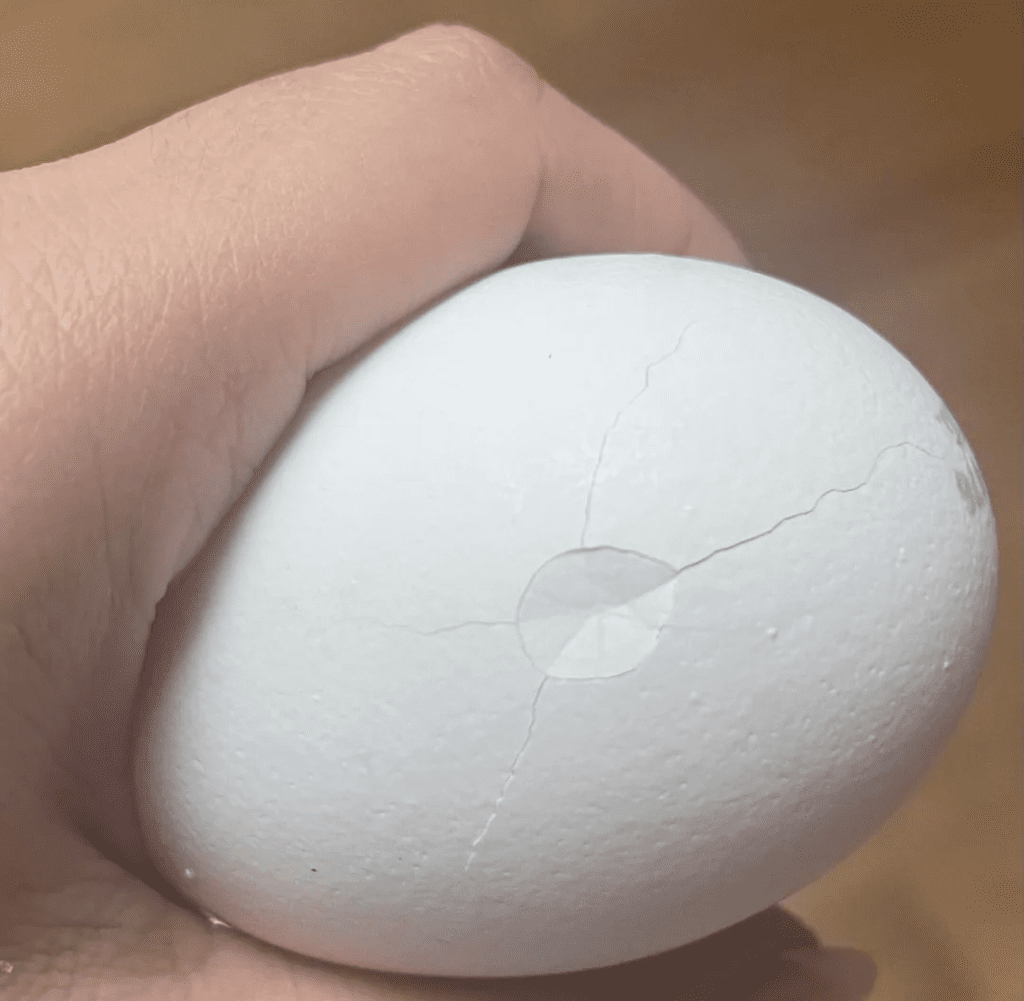Affordable and easy-to-cook eggs are a staple in most Southern kitchens. In fact, Americans eat roughly 280 eggs each year, according to USDA estimates. Eggs are remarkably versatile, so you rarely need to repeat a recipe unless you want to. Fried, poached, scrambled, quiched, or deviled, or incorporated into cakes, brownies, cookies, and beyond; chances are you add a dozen eggs to your cart nearly every trip to the supermarket.
Many of us flip open the top to inspect the eggs inside the carton before ringing it up. But what if you forget to do so—or order grocery delivery or curbside pickup—and find a cracked egg in the carton? Here’s your food-safe strategy.

Is a Cracked Egg Safe to Eat?
The verdict here varies based on if you accidentally cracked the egg yourself (either as part of the recipe process or while transferring groceries from the bag to the refrigerator, for instance), or if the egg was already cracked when you brought it into your home.
An Egg Cracked By Someone Else
Bacteria can easily be introduced to the egg yolk or egg white through any cracks in the shells, so it’s best to steer clear of any cartons with cracked eggs inside if possible, recommends the USDA’s Food Safety and Inspection Service.
If you bought eggs that were already cracked or appear to be chipping, toss those individual eggs ASAP before anyone unknowingly cooks with them. The rest of the uncracked eggs in the carton should be safe to use as long as they are not showcasing any of these four signs an egg has gone bad.
An Egg Cracked By You or Someone in Your Household
If you accidentally cracked the egg as you brought it home or while moving it onto its shelf (by the way, you should ideally not store eggs in the door), you can still use the cracked egg later if you handle it with some TLC from this point forward.
Place the mistakenly-cracked egg into a clean, airtight container, top it with a lid, and store the egg in the refrigerator for up to two days, the USDA says. When you’re ready to use it in your recipe, cook it fully to kill off any potential bacteria.
To extend the life of your egg a little longer, feel free to freeze separated egg whites (an ice cube tray works wonderfully for this). Alternatively, beat whole eggs into a scramble-like mixture, then freeze in a container with a lid. Both should last for up to one year.

Do not freeze separated egg yolks without adding a couple more ingredients first. Check out our primer on how to freeze eggs so you can use those yolks at a later date—and preserve their flavor and texture.
By the way, if eggs crack during the process of hard-boiling, they should be A-OK to peel and consume as usual, the USDA confirms.
How to Safely Cook Eggs (Plus Why Egg Food Safety Matters)
Cooking an egg correctly is a wise strategy any time you prepare eggs. Even uncracked eggs may be contaminated with Salmonella since the bacteria can get inside the egg before the shells are fully formed, the FDA adds. Salmonella can lead to food poisoning, a condition that can include symptoms like vomiting, diarrhea, abdominal cramps, and fever starting about 12 to 72 hours after eating the contaminated eggs and lasting for up to a week.
Here are the safe doneness levels for the most popular egg prep options, per the Egg Safety Center:
- Hard-boiled eggs: 160°F (if cooked properly, hard-boiled eggs will reach 160°F inside—there’s no need to stick a thermometer inside!)
- Omelets, frittatas, quiches, casseroles, stratas, eggnog: 160°F
- Egg white omelets and pie meringues: 144°F to 149°F
- Scrambled, over-easy, over-hard, fried, basted, and poached: 144°F to 158°F
The Surprising Culinary Perks of Cracked Eggs
While cracked eggs may not be ideal for some dishes, they can actually be a great asset in the kitchen if you approach them strategically. Here are a few clever ways to use up those imperfect eggs:

Baking with Cracked Eggs
Cracked eggs work beautifully in baked goods like cakes, cookies, brownies, and quick breads. The structural integrity of the shells isn’t as crucial in these recipes, so you can simply beat the cracked egg(s) into the batter as usual. In fact, the extra air whipped into the egg can even improve the texture of certain baked items.
Egg Wash Substitute
Normally, you’d use a whole egg or an egg yolk to create an egg wash for pastries, breads, or other baked goods. But a cracked egg works just as well! Simply whisk the cracked egg, then brush or drizzle it over your dough or pastry before baking.
Scrambled Eggs or Omelets
Cracked eggs are perfect for whipping up quick scrambles or omelets. Just be sure to fully cook the eggs to kill off any potential bacteria. You can even freeze cracked eggs for later use in these preparations.
Egg Salad or Deviled Eggs
Cracked eggs work brilliantly for egg salad or deviled eggs, as the shells don’t matter in these recipes. Simply peel and chop the cracked eggs, then mix with your desired seasonings, mayo, mustard, and other ingredients.
Quiche or Frittata
A cracked egg or two also won’t affect the final texture of quiche or frittata. Just be sure to fully cook the egg mixture to a safe internal temperature.
Breadcrumb Coating
For fried or breaded items, a cracked egg can serve as the “glue” that helps breadcrumbs or other coatings stick. Simply dip or toss the item in the beaten cracked egg before dredging in breadcrumbs.
Homemade Pasta
Fresh pasta dough often calls for eggs. Cracked eggs work just fine in this application, as the shells will get incorporated into the dough.
Egg-Based Sauces
Hollandaise, béarnaise, and similar emulsion-based sauces call for egg yolks. Cracked eggs work great here, as the yolks will get whisked into the sauce.
So the next time you find a cracked egg in your carton, don’t despair—get creative! With a little strategic thinking, you can put those imperfect eggs to delicious use.
Conclusion
Cracked eggs may not be the most visually appealing, but they certainly don’t have to go to waste. With the right food safety precautions and a bit of culinary ingenuity, you can easily incorporate cracked eggs into all sorts of recipes. From baked goods to sauces to scrambles, these humble ingredients can shine in the kitchen. So next time you crack an egg by accident, don’t toss it—get cooking!


